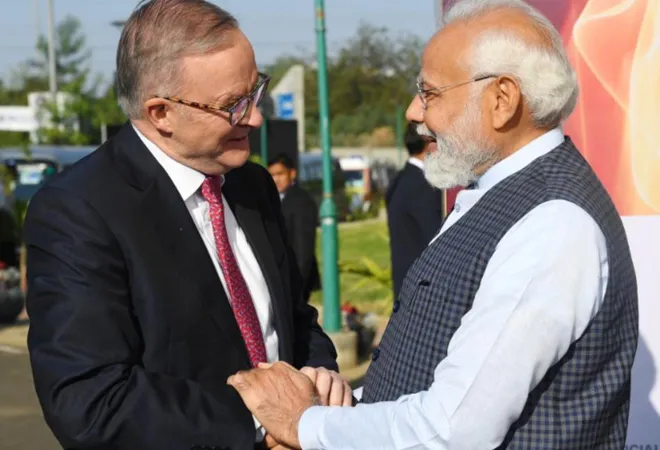 This piece is part of the series, India-Australia Partnership: The Defense Dimension
This piece is part of the series, India-Australia Partnership: The Defense Dimension
India and Australia’s bilateral endeavours to enhance their strategic footprint in the Indo-Pacific must include a greater focus on climate and human security in Pacific Island countries (PICs). Climate change-induced crises together with transnational crime will likely increase food and health insecurity, with
particular impacts on women. There is considerable scope for India and Australia to pursue joint initiatives in human security.
India’s diplomatic outreach to the Pacific Islands is growing from a low base, but now with a steady uptick in trade and development initiatives. Prime Minister Narendra Modi is scheduled to
visit Papua New Guinea in May—the first Indian prime minister to do so.
India can benefit from trade and investment opportunities in these countries, particularly in natural resources. As an advocate for South-South cooperation, India can also play an important role in assisting in regional stability, drawing from its own history of pioneering a ‘partnership’ approach to aid and development, particularly in climate and disaster management. For example, the
International Solar Alliance, of which Australia and many PICs are member countries, uses cost-effective nimble small-scale solutions for climate change, which are more compatible with developing economies and often easier to implement.
By working together on climate and human security, Delhi and Canberra could provide alternate policy and alignment choices, as an alternative to discussions on strategic competition.
The initial focus for cooperation could be on countries where India is building partnerships, such as Fiji, the Solomon Islands, and Papua New Guinea. By working together on climate and human security, Delhi and Canberra could provide alternate policy and alignment choices, as an alternative to discussions on strategic competition. In this regard, linking defence, diplomacy, and development offers a way forward. A multi-pronged approach to climate preparedness and human security should include:
- Disaster risk reduction activities and disaster preparedness simulations, while applying a gender lens.
- Stakeholder mapping to ensure deeper interfacing with community leaders and gender experts.
- Diplomatic cooperation to place a broader climate and gender lens on the regional and multilateral agenda. Releasing joint communiques as a show of strength.
- Triangular Cooperation and aid and infrastructure projects to be designed with a climate-resilience objective, using existing frameworks and institutions.
We have the following recommendations for India-Australia cooperation in the Pacific:
Exploring ‘Triangular Cooperation’ between India, Australia and PICs
The idea of ‘Triangular Cooperation’ in overseas aid and development is not new to India and is gaining traction to bridge the gap between the Global North and South. It combines the capital and resources of traditional donor countries, with the capacity-building capabilities of developing countries, for projects in third countries. There are
several examples of successful partnerships between India and the United Kingdom, the United States (US), and Germany. and United Arab Emirates (UAE). India and Australia can initiate similar projects that have a strong climate focus. India could also learn from the many
Department of Foreign Affairs and Trade (DFAT)- funded climate programmes that incorporate a gender lens, and apply lessons to its aid programmes, where often gender and climate are in separate silos.
The idea of ‘Triangular Cooperation’ in overseas aid and development is not new to India and is gaining traction to bridge the gap between the Global North and South.
Triangular cooperation also extends to diplomacy, where there are many mutual lessons to be learnt. The Coalition for Disaster Resilient Infrastructure (
CDRI), launched by India, could be a resource for developing climate-resilient projects and provides an opportunity to mainstream gender as a cross-cutting issue, to integrate human and climate security.
Mainstreaming gender in Humanitarian Assistance and Disaster Relief (HADR) and Disaster Risk Relief (DRR)
Climate change threatens human security, particularly gender equality, further compounding the cascading risks and effects of climate change. A
study by the Asian Development Bank found that disaster impacts are not gender-neutral—in societies where the socioeconomic status of women is low, natural disasters kill more women than men. Integrating a gendered perspective into disaster management can strengthen an entire community’s resilience, especially when indigenous ideas and a bottom-up approach are instituted.
The demand for HADR is amongst the
highest in the Indo-Pacific region, where civil-military integration can enhance effectiveness. Defence forces are well suited to conduct HADR operations, because of their organisational cohesiveness and logistical capacity.
Integrated civil-military responses can also enhance effectiveness. India and Australia could better use the growing numbers of women in their armed forces to contribute towards
gender-focused disaster recovery. For example, the
National Disaster Response Forces, India’s specialised paramilitary forces for disaster response, are now
mandated to have at least 108 women per battalion.
Integrating a gendered perspective into disaster management can strengthen an entire community’s resilience, especially when indigenous ideas and a bottom-up approach are instituted.
Mainstreaming gender does not necessarily require drastic changes. The existing multilateral
Sendai Framework acknowledges the vulnerabilities that women face in disasters and recognises the role of women in risk reduction offering ideas for concrete action. The Australian government currently supports the
Women’s Resilience to Disasters programme, in Fiji, Kiribati, and Vanuatu. It may also be useful to look at the experiences of gender-sensitive disaster management in India. The Indian state of Orissa has taken steps to mainstream gender through
capacity-building and
gender budgeting, one of the earliest in India.
Experience from these initiatives can be brought into the broader security sector to
‘create a culture of allyship’, ensuring that the underlying values of equity and justice are paramount and contribute towards strengthening resilience. India is taking a leading role in developing coalitions across the Global South, presenting alternatives.
While both India and Australia can consolidate their strategic presence in the region, any contribution to the overall development of security in the Pacific through aid and diplomacy would benefit from collaboration. Collaborative approaches can provide a framework for incorporating diverse perspectives, and multiple stakeholders, and reiterates a universal commitment to countering climate change. A smart multi-pronged approach with a combination of short-term and long-term initiatives that put human security and gender at the heart of climate adaptation-related activities is the way forward.
This article was written as part of the Australia India Institute’s Defence Program, undertaken with the support of the Australian Department of Defence. All views expressed in this article are those of the authors only.
Ambika Vishwanath is the Founding Director of Kubernein Initiative, a geopolitical advisory. She is a water security specialist with experience in the field of governance, gender, and foreign policy.
Aditi Mukund is a Program Associate at Kubernein Initiative, leading their work and projects on gender and Feminist Foreign Policy
The views expressed above belong to the author(s). ORF research and analyses now available on Telegram! Click here to access our curated content — blogs, longforms and interviews.



 This piece is part of the series,
This piece is part of the series,  PREV
PREV


